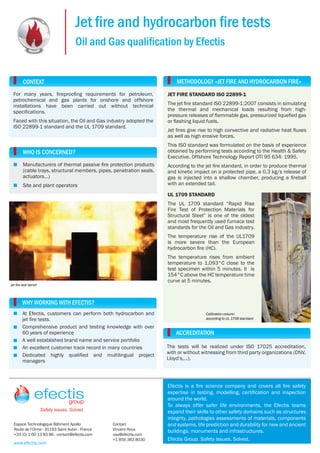Efectis Group - Jet Fire and Hydrocarbon fire tests
- 1. Jet fire and hydrocarbon fire tests Oil and Gas qualification by Efectis CONTEXT For many years, fireproofing requirements for petroleum, petrochemical and gas plants for onshore and offshore installations have been carried out without technical specifications. Faced with this situation, the Oil and Gas industry adopted the ISO 22899-1 standard and the UL 1709 standard. METHODOLOGY ┬½JET FIRE AND HYDROCARBON FIRE┬╗ JET FIRE STANDARD ISO 22899-1 The jet fire standard ISO 22899-1:2007 consists in simulating the thermal and mechanical loads resulting from high- pressure releases of flammable gas, pressurized liquefied gas or flashing liquid fuels. Jet fires give rise to high convective and radiative heat fluxes as well as high erosive forces. This ISO standard was formulated on the basis of experience obtained by performing tests according to the Health & Safety Executive, Offshore Technology Report OTI 95 634: 1995. According to the jet fire standard, in order to produce thermal and kinetic impact on a protected pipe, a 0.3 kg/s release of gas is injected into a shallow chamber, producing a fireball with an extended tail. Espace Technologique B├ótiment Apollo Route de lŌĆÖOrme - 91193 Saint Aubin - France +33 (0) 1 60 13 83 86 - contact@efectis.com www.efectis.com Efectis is a fire science company and covers all fire safety expertise in testing, modelling, certification and inspection around the world. To always offer safer life environments, the Efectis teams expand their skills to other safety domains such as structures integrity, pathologies assessments of materials, components and systems, life prediction and durability for new and ancient buildings, monuments and infrastructures. Efectis Group. Safety issues. Solved. group efectis Safety issues. Solved. Contact Vincent Roux usa@efectis.com +1 856 383 8030 Manufacturers of thermal passive fire protection products (cable trays, structural members, pipes, penetration seals, actuatorsŌĆ”) Site and plant operators WHO IS CONCERNED? At Efectis, customers can perform both hydrocarbon and jet fire tests. Comprehensive product and testing knowledge with over 60 years of experience A well established brand name and service portfolio An excellent customer track record in many countries Dedicated highly qualified and multilingual project managers WHY WORKING WITH EFECTIS? UL 1709 STANDARD The UL 1709 standard ŌĆ£Rapid Rise Fire Test of Protection Materials for Structural SteelŌĆØ is one of the oldest and most frequently used furnace test standards for the Oil and Gas industry. The temperature rise of the UL1709 is more severe than the European hydrocarbon fire (HC). The temperature rises from ambient temperature to 1,093┬░C close to the test specimen within 5 minutes. It is 154┬░C above the HC temperature time curve at 5 minutes. Calibration column according to UL 1709 standard jet fire test bench ACCREDITATION The tests will be realized under ISO 17025 accreditation, with or without witnessing from third party organizations (DNV, LloydŌĆÖs,...).
